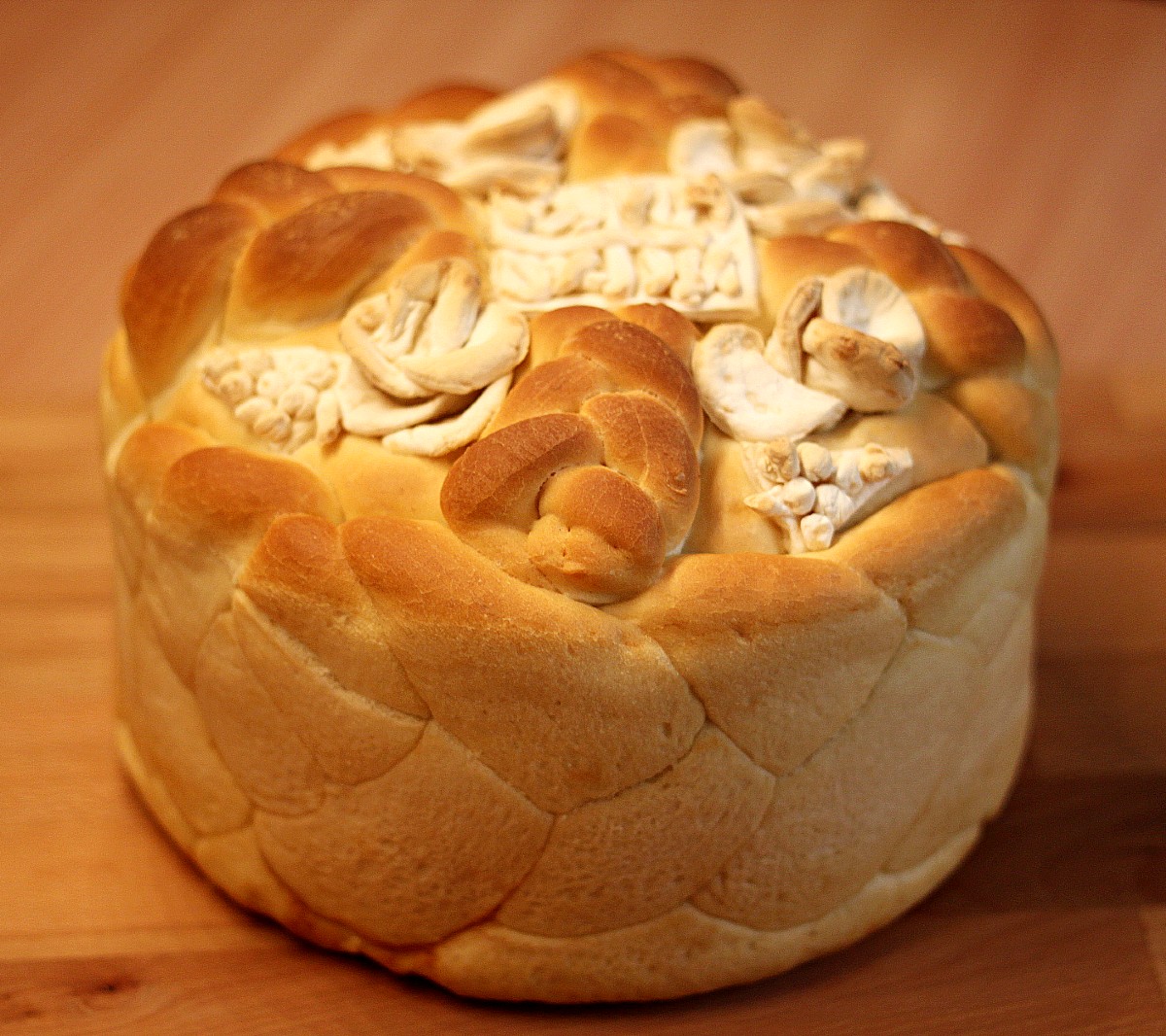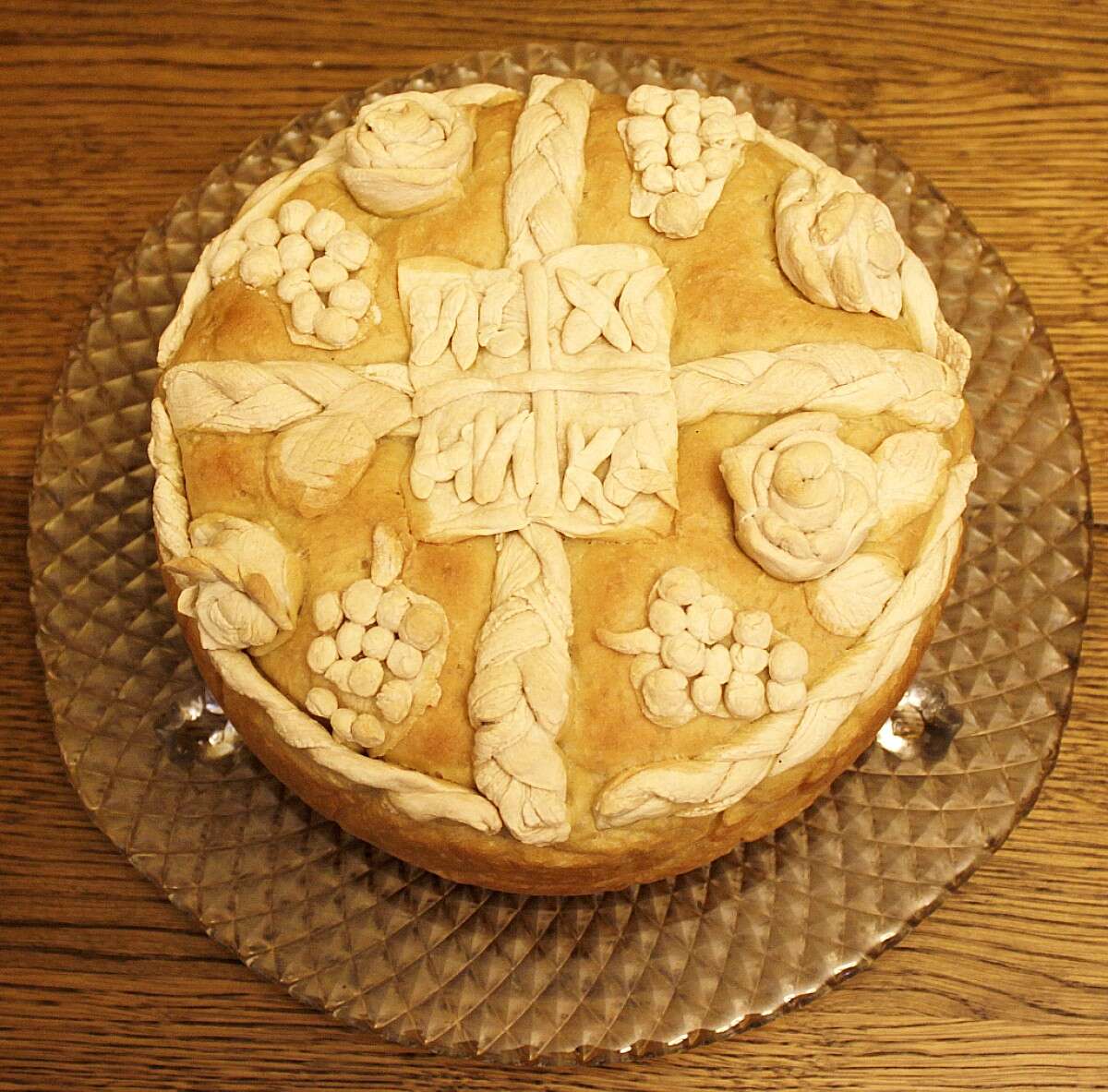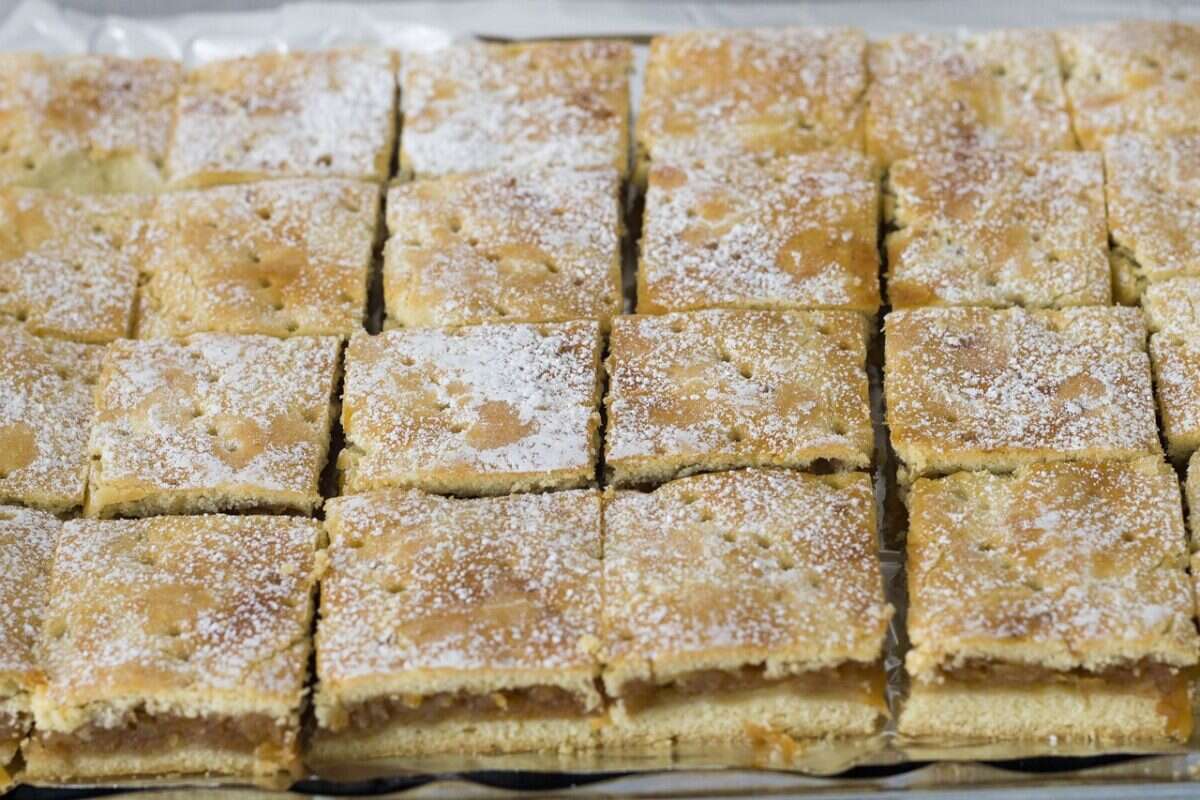Lenten Slavic cake is the decoration of every Slavic table, the most impressive and central part. And every housewife knows how much love and skill she put into the preparation process, so that everything turned out as it should.
Of course, Lenten Slav cake is prepared for Lent feasts, but this recipe is so good, that there is no reason not to prepare it for fat feasts as well.
Lent celebration cake, soft and delicious
 Postni Slavic cake, ingredients:
Postni Slavic cake, ingredients:
- 700 g flour type "400" soft
- 100 g of sharp flour
- 470 ml of water
- 10 g of dry yeast
- 1 teaspoon of sugar
- 2 teaspoons of salt
- 9 tablespoons of oil
Lent celebration cake, decorations:
- 100 g density
- water
- a bit of salt

Lent celebration cake, preparation:
- The water must be hot, pour sugar and dry yeast into it and mix well. Add salt, so that it also dissolves well.
- Pour the liquid with yeast into the flour and knead a smooth, soft dough that does not stick to your hands.
- Cover the dough and let it rest until it doubles in size.
- Divide the dough into two parts.
- From one part, make a braid, which you place next to the greased wall of the pan, in which you bake the Lenten Slavonic cake.
- Place the second part of the dough, shaped into a ball, in the middle of the pan.
- Spray the surface of the celebration cake with a water sprayer (set to water dust).
- Make the decorations from the pulp, with a little salt and water. Knead the harder dough. Shape the decorations as you wish and stick them on the cake.
- Leave the cake for 30 minutes in a warm place, covered, to rise nicely.
- Heat the oven to 200 degrees and bake the Slavic cake for the first 15 minutes, then reduce the temperature to 180 degrees. If your oven is strong, cover the surface of the Slavic cake with baking paper, so that it does not burn, and continue baking for another 20-30 minutes.
When the cake is baked, carefully take it out on a clean kitchen towel and coat it with a mixture of oil and warm water to give it a nice shine.
GLORY, THE NAME OF THE CROSS, THE GLORY OF THE CROSS (Source: Center for Intangible Cultural Heritage of the Republic of Serbia)
Short Description:
Slava is a complex of ritual and social practices by which a family celebrates a saint it believes to be its protector and giver of well-being. The celebration of the patron saint of the family is practiced by the majority of Orthodox Christian families throughout the Republic of Serbia as an important family holiday in which individual families and their guests - extended family members, neighbors, friends and members of the local community - participate.
Detailed description:
The celebration of the patron saint consists of the ritual offering of a bloodless sacrifice and a feast arranged for relatives, neighbors and friends. The bloodless sacrifice is bread and wine and grain (symbols of Christ's body and blood, fertility and well-being). In the family's home, on the day dedicated to the saint they celebrate during the ritual, a specially designated slavish candle is lit, the Our Father prayer is read and the slavish cake is cut (it must have the IS HS NI KA symbol stamped on it) by pouring wine over it, cutting it into the shape of the cross, then turns and breaks into four parts while lifting up. During the ritual, thanks to the saint and prayers for well-being are said. Ritual cake cutting is performed by the host with the oldest or most important guest ("dolibaša"), his heir and other family members. The Slavic feast begins with the ceremonial drinking of wine, eating "koljiva" and Slavic cake and saying toasts ("toasts") and wishes for health, fertility and well-being of the family and guests, and continues with a meal that symbolizes well-being. The Slavic feast necessarily contains meat (pig, lamb or, during Lent, fish) as a recurrence of the blood sacrifice. When preparing the feast, families generally adhere to Christian canons regarding fasting.
Some families take the celebration cake to church where it is ritually cut with an Orthodox priest, or on the day of celebration, the priest comes to the family's home to cut the cake.
In the celebration ritual, a special role is played by the host - the oldest male member of the family - who organizes the celebration, cuts the cake and breaks it with other ritual participants, he is the first to say prayers for prosperity. An important role is also played by the dolibash who cuts the celebratory cake with the host. In a large number of families, the Orthodox priest has an equal role in cutting the cake, regardless of whether the cake is cut in the church or in the family's home.
The importance of the host woman can be seen in the fact that she herself prepares the celebratory cake (one or more of them) and then she shows her skill by making dough symbols and richly decorating the cake. Women have an important role in the transmission and preservation of this tradition because they are the bearers of knowledge about the performance of rituals - they know the structure and chronology of rituals and are the bearers of folk knowledge about the meaning and purpose of certain elements of the ritual - and orally pass this knowledge on to younger family members as an integral part family upbringing.
A special role in the performance of the Slavic ritual and during the festive feast can also be played by the "toaster", a guest who is adept at making and saying toasts - ritual verbal formulas that invoke the well-being of the family.
In the domain of religious opinion, family glory has the role of providing the family with religious communication with the patron saint and through that communication providing it with a certain and prosperous future. sacrifice, has functionality in regulating interpersonal and intergroup social relations, a functionality that is based on more or less strict reciprocity of hospitality. The Slavic feast takes place in a sacred time and space in which the maintenance of existing and the establishment of new social ties has a special "sacred weight" that ensures the longevity of those relationships. Social ties confirmed and cyclically renewed in the sanctity of the Slavic ceremonial are used as a social support in various social and economic situations and social spaces. Celebrating the patron saint of the family provides the necessary integrity within the community and integration into the wider community.
Celebrating the patron saint is characteristic for Orthodox Christian families and in multi-ethnic and multi-confessional areas, through participation in the Slavic feast, it plays an important role in establishing and maintaining inter-ethnic and inter-cultural dialogue.
Serbs recognize the glory as a way of expressing their ethnic identity and they are the bearers of this tradition, but the celebration of the family patron saint is practiced by Orthodox Christian families and other ethnic communities in Serbia.
The list to which the element is written:
Unesco
A representative list of the intangible cultural heritage of humanity
Date of entry :
27.11.2014.
Link to the registration website: http://www.unesco.org/culture/ich/en/RL/slava-celebration-of-family-saint-patrons-day-01010
READ: WHERE CAN I BUY THE BOOK TRADITIONAL RECIPES OF HOME SERBIAN CUISINE?
Read more:
The Recipes and Kuvar online portal is ranked among the TOP 50 websites in Serbia!
Don't miss a recipe - Recipes and cookbook online on Facebook. Stay tuned, follow the Recipes and Cookbook twitter notifications!







